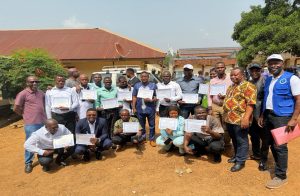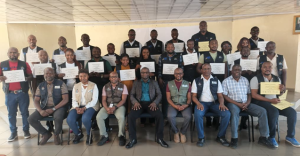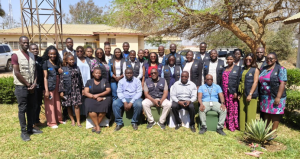AFENET supports capacity building efforts on Expanded Program on Immunization (EPI) for national health personnel in South Sudan
-
by
AFENET
The African Field Epidemiology Network (AFENET) has since 2016, implemented the Expanded Program on Immunization (EPI) Capacity Building (ECB) project in the Republic of South Sudan, in partnership with the Ministry of Health (MoH), US CDC, UNICEF, WHO, and Bill & Melinda Gates Foundation. This project was premised on an external review earlier in 2011 that revealed a limited number of trained health personnel specialized in managing EPI services at all levels of the health system. As a result, the 9th Horn of Africa Technical Advisory Group (HOA-TAG) meeting of May 2013 recommended that South Sudan should develop a long-term plan to transition the critical technical support from external partners to national staff. Subsequently, South Sudan developed a 3-year human resources development plan to address the chronic staffing gap in the EPI sustainably.
The main objective of the ECB project, therefore, was to build capacity of national health personnel on EPI. Other objectives were to: roll out a three years’ mentorship project on immunization; build capacity among South Sudan nationals in EPI core competencies; ensure quality immunization services were provided to communities across the country; and improve supportive supervision and provide on-the-job training for new and inexperienced vaccinators.

Through this project AFENET worked with partners to build the national immunization capacity in 7 core capacities namely: routine EPI operations management, supplemental immunization activities management (SIA), Vaccine Preventable diseases surveillance, EPI communications, EPI data management, immunization supply chain management (EPI logistics) and cold chain management.
In spite of security challenges coupled with geo-political changes in the country, the project has made a remarkable contribution to the EPI program in South Sudan. The capacity of 95 competent nationals has been enhanced through field-based mentorship. These are currently working for the EPI program in various capacities at national and state levels. MOH partners like UNICEF, WHO, and Gavi are utilizing these competent EPI officers to improve immunization services in the country. In addition, the EPI officers successfully piloted a vaccine utilization project in all the states, of which the findings are being used to forecast vaccine needs for the country. The value that the trained officers bring to the EPI program was aptly captured at a graduation function for EPI officers on 29 March 2022, by Deng Mawien, the graduands’ representative when he stated that: “One day donors will not be there to support our government but we will ensure that we will be available.”



